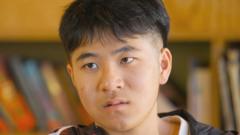Reports reveal alarming cases in China where dissenting citizens are forcibly hospitalized and treated for mental illnesses after protesting against government policies, raising concerns about human rights violations and the politicization of mental health care.
Censorship and Forced Hospitalization: A Look at Mental Health Abuse in China

Censorship and Forced Hospitalization: A Look at Mental Health Abuse in China
A deep dive into the troubling accounts of individuals hospitalized under the guise of mental illness for protesting against government policies in China.
Zhang Junjie, a 17-year-old student, raised a blank sheet of paper in protest against censorship, only to find himself confined to a psychiatric hospital, forced into treatment for schizophrenia. His story is just one of many that highlight the troubling use of mental health facilities in China to silence dissent. Interviews conducted by the BBC reveal that numerous individuals have been involuntarily committed and subjected to anti-psychotic medications and even electroconvulsive therapy (ECT) after voicing opposition to the government's policies.
After taking a stand against China’s stringent pandemic lockdown measures, Junjie was swiftly reported by faculty from his university, subsequently leading to his hospitalization on the day of his 18th birthday. Despite being restrained, beatings from hospital staff, and enduring a 12-day ordeal, Junjie emerged only to face another arrest. This time, he was charged with "picking quarrels and troublemaking" for making a video of himself igniting fireworks during a ban, a common charge aimed to stifle criticism of the regime.
Struggling with enforced psychiatric treatment and surveillance by the police, he eventually sought refuge in New Zealand, unable to part ways with his family. His experience is echoed by at least 58 others who have recounted similar tales of abuse, highlighting systemic failures in China’s mental health legislation designed to prevent such misuse.
According to Huang Xuetao, a prominent Chinese lawyer, the rise in involuntary psychiatric admissions reflects a chilling regression in civil liberties, stating, "The police want power while avoiding responsibility." Activists like Jie Lijian have also documented their harrowing experiences, illustrating patterns of misuse of ECT and psychotropic drugs as tools of political oppression.
The examination of medical records sheds light on concerning practices where political dissent is equated with mental illness, prompting the alarmingly simple admission process for "troublemakers." One patient recalled an excruciating experience of ECT, leading to permanent health issues and a costly battle for justice against the system that wrongfully incarcerated him.
Despite legislative efforts to curb such abuses, a significant number of individuals have found their appeals to the judicial system elusive, with only two successful cases documented among hundreds. This reality reveals the dangerous confluence of law enforcement and mental health care in China, effectively weaponizing diagnoses to repress free speech.
The international community has begun to focus on these egregious human rights violations, spotlighted by the recent experience of vlogger Li Yixue, who after publicly accusing a police officer of sexual assault, was reportedly hospitalized again following her viral posts.
The UK Chinese embassy maintains a stance that the Communist Party is committed to improving legal mechanisms to safeguard against unlawful detentions. However, the narrative emerging from these personal accounts paints a grim picture of how far these policies deviate from reality in protecting citizen rights in China.





















